“People go nuts over peony,” says Darragh McCullough smiling, as he steps across the beds in a vast field close to Elmgrove Flower Farm Shop, just off the busy Drogheda Road, near Gormanston, Co Meath.
As he points to a trickle irrigation pipe – which delivers a dilute fertiliser to the flowers to feed the crop and minimise the use of weed spray – a striking pink perennial comes into view.
Generally harvested in late May and June, the “peony is the latest big-ticket item” in the floristry world, according to Darragh, and customers absolutely love them.
The Meath man grows ten different varieties in what he jokingly describes as his “peony orchard.” This helps ensure sequential flowering over many weeks to meet the strong demand.
All 100,000 peony stems are cut by hand by a team of three working in the fields, and at the time of our visit, there were 10,000 stems in a fridge to lengthen the lifespan.
“Peonies are one of the flowers we can grow here, just about. They’re also quite valuable flowers. On wholesale markets, I might get 4c a stem for my daffodils, whereas these will make ten times that.”
Selling the flowers directly in their shop and online quadruples the value and the margin, he says.
Daffodils are still the main crop though accounting for 98 acres of 100 planted. He adds to that with sunflowers, foliage, berry plants and flowers like dahlias grown in a tunnel.
“There are only a few spots on the globe suitable to grow daffodils, and they are typically the same places that can grow grass all year around,” says Darragh.
“We can pick 500,000 stems in a day now. It’s pretty fast and furious when nature decides to switch on and bloom.”
In all, the farm harvested a whopping 12 million daffodil stems this year, 90% of which are sold wholesale all over the world.
With the first anniversary of the farm shop, which employs 10 people, approaching in early July, Darragh is looking forward to a party.
Over that short time it has become a popular destination to linger. There’s a coffee truck outside, plants for sale, a play area for kids, and hens clucking about an enclosure where you can get your free-range eggs. In the evenings, a pizza van opens for business.
“What’s been pleasantly surprising is the number of neighbours who have told me it’s a great addition to the area,” he says of the shop, which supports many other local producers.
It is a difficult business and there are only seven commercial flower growers that Darragh knows of.
However, he takes great pride in the fact that he can give customers around a 50/50 split between Irish produce and imported flowers throughout the year.
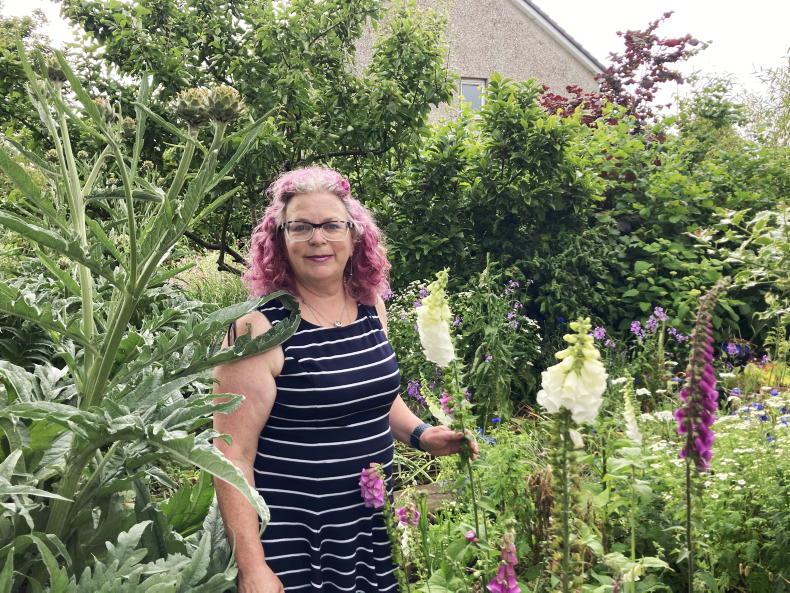
Anna Browne from Big Sky Flowers. \ Mikey Duke
For many, flower farming immediately conjures up images of vast fields of golden daffodils or tulips. But step forward Anna Browne from Big Sky Flowers, who is challenging that perception with her micro-flower farm at her semi-detached home in an estate on the outskirts of Mullingar.
As we speak recently with the rain falling down, Anna is looking at beautiful and fragrant summer blooms like Sweet William, foxglove, alliums, ammi, and wild carrot at her “compact but intensively farmed” front and back garden in Greenpark Meadows on the Ballymahon Road.
Sustainability and biodiversity are at the heart of everything she does in her chemical-free garden, where the lawns and grass strip along the pathway have been converted using no-dig principles into a fabulous oasis of growth.
Anna also makes her own compost to ensure her soil and plants thrive. There’s a polytunnel at the back – home to flowers and vegetables, a chicken run, fruit bushes, a pond, and some established trees.
“I can definitely make quite a few bouquets out of what is in my back garden on any given day,” says Anna, a lifelong and passionate grower who is also a floral artist.
She grew up on a farm in nearby Tullaghan, where her brother Joe still operates Lough Owel Organic beef farm. Having previously worked in the tech industry, and several years in America, Anna says she was always growing something wherever she was based.
“That’s always been in me. I’m not right unless I’m in a field or I have my hands dirty,” she says, laughing.
In 2018, she started growing flowers on the side and mostly giving them away. When she was laid off right before the Covid pandemic, Anna decided to leave IT behind.
In tandem with that, she started to work with the Refill Mill, a local zero-waste shop, to develop hands-on workshops to teach some of the old skills she had grown up with. That, plus others, like soap making and sourdough bread making, that she taught herself along the way.
Now, she teaches a range of workshops, from jam jar flower workshops to kombucha making, compost workshops, and fermented foods, among others, to individuals, community groups, and young people.
A member of the Flower Farmers of Ireland, she wants to help people live more sustainably, and flowers are a big part of that conversation.
“You work hard, but what farmer doesn’t? I wouldn’t say I make a huge amount of money doing it, but I’m 61, and at this point in my life, it’s a passion project for me.
“I probably would make more from the different workshops I run. At the same time, the flowers are at the centre of it all, and being able to talk about the carbon footprint of imported flowers is important.
“We have statistics from a UK study, that if you buy a bouquet in the supermarket, it’s about 30kg of carbon. For context, a flight from London to Paris is 60kg.”
“When you’re buying flowers, you don’t think of that. But if you are getting a bunch of locally grown flowers, it’s less than a kg,” she says.
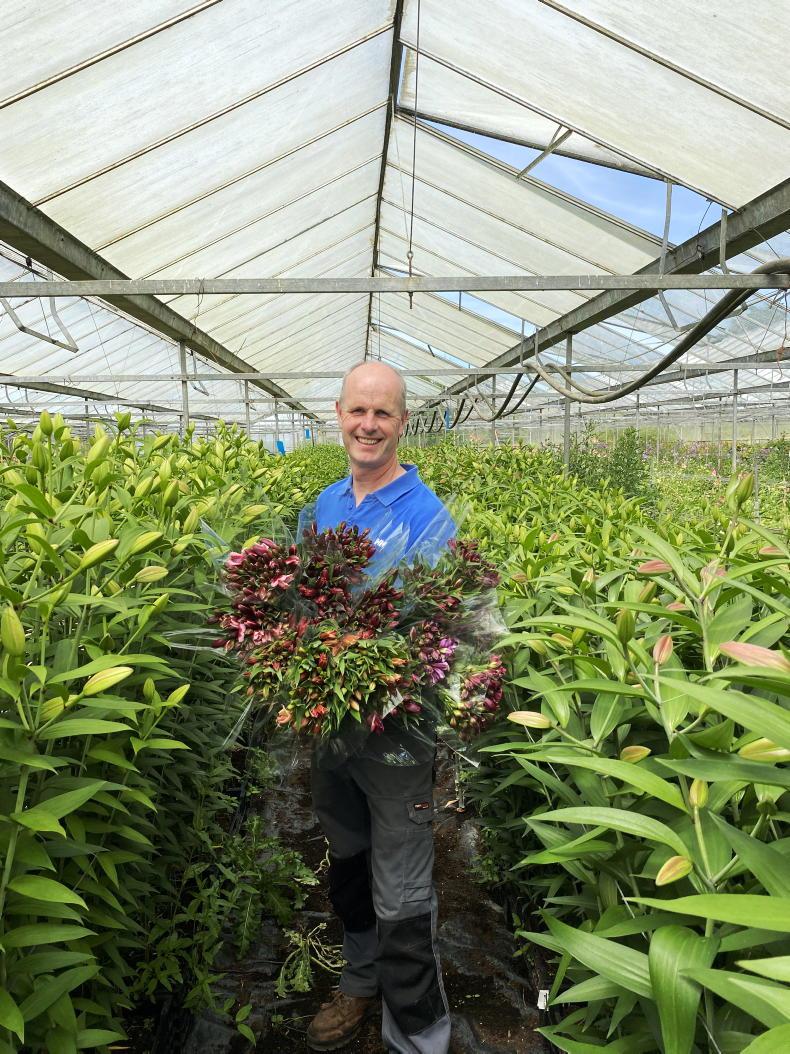
Tom Fitzgerald pictured in his glasshouse in Parteen surrounded by Oriental lilies.
Tom Fitzgerald has spent the morning planting 3,000 Oriental lilies in crates at his farm in Parteen, just inside the Clare border, only three miles from Limerick city.
While it’s extremely labour-intensive and physically demanding, he loves working with the soil and believes strongly in the therapeutic benefits of growing and horticulture.
So much so, Tom from Fitzgerald Nurseries is strongly of the view that seeing a seed grow into a plant to harvest or a flower is hugely beneficial for young people, and it should be a subject taught in schools.
“If you can grow any sort of plant, you’ll be able to feed yourself,” he says, and that’s without talking about the joy of tending to plants and watching a living organism grow.
“I grow alstroemeria, Oriental lilies, calla lilies, strawberries, and eucalyptus. It’s a bit of a mix,” he says, laughing.
Tom has the equivalent of two acres growing under cover in a large glasshouse and several polytunnels all year round but production is much lower from November to March, since he stopped heating the greenhouse. A newer addition is eucalyptus, spread over two and a half acres outdoors for harvest from November to spring.
In addition to lengthening his season and boosting his income, Tom says there is a great demand for the “unique, different, and scented” eucalyptus that thrives in Ireland.
He also grows 20,000 strawberry plants, one of only a handful of growers in Munster to do so. This complements the floral venture and boosts his income.
Flower farming took root in Tom from his late father Tom, who had gone to Warrenstown horticultural college in the 1950s. He later became a creamery manager and a farmer before moving into growing vegetables and then cut flowers.
The Parteen man remembers that the first flowers his father grew were chrysanthemums in the late 1980s, and he kept that going until his retirement in the 1990s. Tom and his brother David came into the family business, trying to grow all kinds of flowers in a bid to make a consistent living. His brother later branched into wholesale and is now one of Tom’s main buyers.
“My main customers are my brother in Fitzgerald Flowers in Limerick, Keelings Flowers in Dublin, a few local flower shops, and Limerick Farmers Market,” says the Clare man, who employs one person full-time and two seasonal workers. His sons, Mark and Shane, also help out.
But with higher labour and business costs and huge competition from abroad, Tom says it is getting “tougher and tougher to make money out of the flowers” in this country. For him to grow through the winter, sustainably would require a major investment of around a quarter of a million euros in a biomass heating system and lights.
“My competition isn’t just from Ireland; it’s from places like Colombia, Venezuela, and the African countries.”
Although imported flowers make up the bulk of sales in Ireland, Tom is proud to have a local produce badge on his stems. He urges customers to try and support Irish producers where they can. While Tom loves his way of life, he admits it is a struggle to make a living. He sees himself growing more eucalyptus and strawberries in the future, where there is huge demand.
“People go nuts over peony,” says Darragh McCullough smiling, as he steps across the beds in a vast field close to Elmgrove Flower Farm Shop, just off the busy Drogheda Road, near Gormanston, Co Meath.
As he points to a trickle irrigation pipe – which delivers a dilute fertiliser to the flowers to feed the crop and minimise the use of weed spray – a striking pink perennial comes into view.
Generally harvested in late May and June, the “peony is the latest big-ticket item” in the floristry world, according to Darragh, and customers absolutely love them.
The Meath man grows ten different varieties in what he jokingly describes as his “peony orchard.” This helps ensure sequential flowering over many weeks to meet the strong demand.
All 100,000 peony stems are cut by hand by a team of three working in the fields, and at the time of our visit, there were 10,000 stems in a fridge to lengthen the lifespan.
“Peonies are one of the flowers we can grow here, just about. They’re also quite valuable flowers. On wholesale markets, I might get 4c a stem for my daffodils, whereas these will make ten times that.”
Selling the flowers directly in their shop and online quadruples the value and the margin, he says.
Daffodils are still the main crop though accounting for 98 acres of 100 planted. He adds to that with sunflowers, foliage, berry plants and flowers like dahlias grown in a tunnel.
“There are only a few spots on the globe suitable to grow daffodils, and they are typically the same places that can grow grass all year around,” says Darragh.
“We can pick 500,000 stems in a day now. It’s pretty fast and furious when nature decides to switch on and bloom.”
In all, the farm harvested a whopping 12 million daffodil stems this year, 90% of which are sold wholesale all over the world.
With the first anniversary of the farm shop, which employs 10 people, approaching in early July, Darragh is looking forward to a party.
Over that short time it has become a popular destination to linger. There’s a coffee truck outside, plants for sale, a play area for kids, and hens clucking about an enclosure where you can get your free-range eggs. In the evenings, a pizza van opens for business.
“What’s been pleasantly surprising is the number of neighbours who have told me it’s a great addition to the area,” he says of the shop, which supports many other local producers.
It is a difficult business and there are only seven commercial flower growers that Darragh knows of.
However, he takes great pride in the fact that he can give customers around a 50/50 split between Irish produce and imported flowers throughout the year.

Anna Browne from Big Sky Flowers. \ Mikey Duke
For many, flower farming immediately conjures up images of vast fields of golden daffodils or tulips. But step forward Anna Browne from Big Sky Flowers, who is challenging that perception with her micro-flower farm at her semi-detached home in an estate on the outskirts of Mullingar.
As we speak recently with the rain falling down, Anna is looking at beautiful and fragrant summer blooms like Sweet William, foxglove, alliums, ammi, and wild carrot at her “compact but intensively farmed” front and back garden in Greenpark Meadows on the Ballymahon Road.
Sustainability and biodiversity are at the heart of everything she does in her chemical-free garden, where the lawns and grass strip along the pathway have been converted using no-dig principles into a fabulous oasis of growth.
Anna also makes her own compost to ensure her soil and plants thrive. There’s a polytunnel at the back – home to flowers and vegetables, a chicken run, fruit bushes, a pond, and some established trees.
“I can definitely make quite a few bouquets out of what is in my back garden on any given day,” says Anna, a lifelong and passionate grower who is also a floral artist.
She grew up on a farm in nearby Tullaghan, where her brother Joe still operates Lough Owel Organic beef farm. Having previously worked in the tech industry, and several years in America, Anna says she was always growing something wherever she was based.
“That’s always been in me. I’m not right unless I’m in a field or I have my hands dirty,” she says, laughing.
In 2018, she started growing flowers on the side and mostly giving them away. When she was laid off right before the Covid pandemic, Anna decided to leave IT behind.
In tandem with that, she started to work with the Refill Mill, a local zero-waste shop, to develop hands-on workshops to teach some of the old skills she had grown up with. That, plus others, like soap making and sourdough bread making, that she taught herself along the way.
Now, she teaches a range of workshops, from jam jar flower workshops to kombucha making, compost workshops, and fermented foods, among others, to individuals, community groups, and young people.
A member of the Flower Farmers of Ireland, she wants to help people live more sustainably, and flowers are a big part of that conversation.
“You work hard, but what farmer doesn’t? I wouldn’t say I make a huge amount of money doing it, but I’m 61, and at this point in my life, it’s a passion project for me.
“I probably would make more from the different workshops I run. At the same time, the flowers are at the centre of it all, and being able to talk about the carbon footprint of imported flowers is important.
“We have statistics from a UK study, that if you buy a bouquet in the supermarket, it’s about 30kg of carbon. For context, a flight from London to Paris is 60kg.”
“When you’re buying flowers, you don’t think of that. But if you are getting a bunch of locally grown flowers, it’s less than a kg,” she says.

Tom Fitzgerald pictured in his glasshouse in Parteen surrounded by Oriental lilies.
Tom Fitzgerald has spent the morning planting 3,000 Oriental lilies in crates at his farm in Parteen, just inside the Clare border, only three miles from Limerick city.
While it’s extremely labour-intensive and physically demanding, he loves working with the soil and believes strongly in the therapeutic benefits of growing and horticulture.
So much so, Tom from Fitzgerald Nurseries is strongly of the view that seeing a seed grow into a plant to harvest or a flower is hugely beneficial for young people, and it should be a subject taught in schools.
“If you can grow any sort of plant, you’ll be able to feed yourself,” he says, and that’s without talking about the joy of tending to plants and watching a living organism grow.
“I grow alstroemeria, Oriental lilies, calla lilies, strawberries, and eucalyptus. It’s a bit of a mix,” he says, laughing.
Tom has the equivalent of two acres growing under cover in a large glasshouse and several polytunnels all year round but production is much lower from November to March, since he stopped heating the greenhouse. A newer addition is eucalyptus, spread over two and a half acres outdoors for harvest from November to spring.
In addition to lengthening his season and boosting his income, Tom says there is a great demand for the “unique, different, and scented” eucalyptus that thrives in Ireland.
He also grows 20,000 strawberry plants, one of only a handful of growers in Munster to do so. This complements the floral venture and boosts his income.
Flower farming took root in Tom from his late father Tom, who had gone to Warrenstown horticultural college in the 1950s. He later became a creamery manager and a farmer before moving into growing vegetables and then cut flowers.
The Parteen man remembers that the first flowers his father grew were chrysanthemums in the late 1980s, and he kept that going until his retirement in the 1990s. Tom and his brother David came into the family business, trying to grow all kinds of flowers in a bid to make a consistent living. His brother later branched into wholesale and is now one of Tom’s main buyers.
“My main customers are my brother in Fitzgerald Flowers in Limerick, Keelings Flowers in Dublin, a few local flower shops, and Limerick Farmers Market,” says the Clare man, who employs one person full-time and two seasonal workers. His sons, Mark and Shane, also help out.
But with higher labour and business costs and huge competition from abroad, Tom says it is getting “tougher and tougher to make money out of the flowers” in this country. For him to grow through the winter, sustainably would require a major investment of around a quarter of a million euros in a biomass heating system and lights.
“My competition isn’t just from Ireland; it’s from places like Colombia, Venezuela, and the African countries.”
Although imported flowers make up the bulk of sales in Ireland, Tom is proud to have a local produce badge on his stems. He urges customers to try and support Irish producers where they can. While Tom loves his way of life, he admits it is a struggle to make a living. He sees himself growing more eucalyptus and strawberries in the future, where there is huge demand.







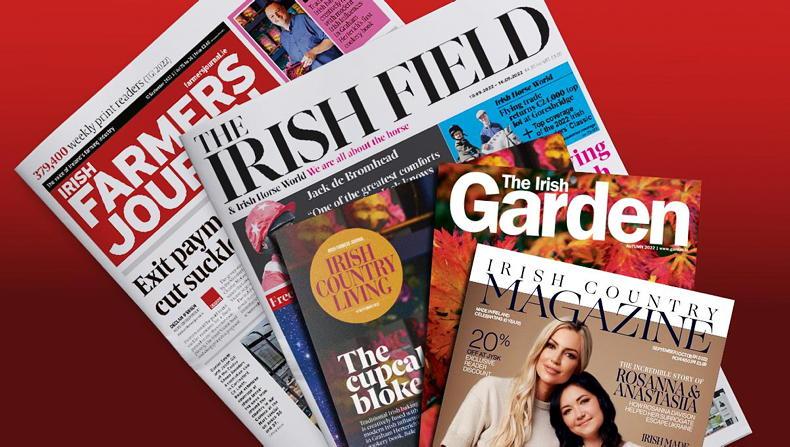
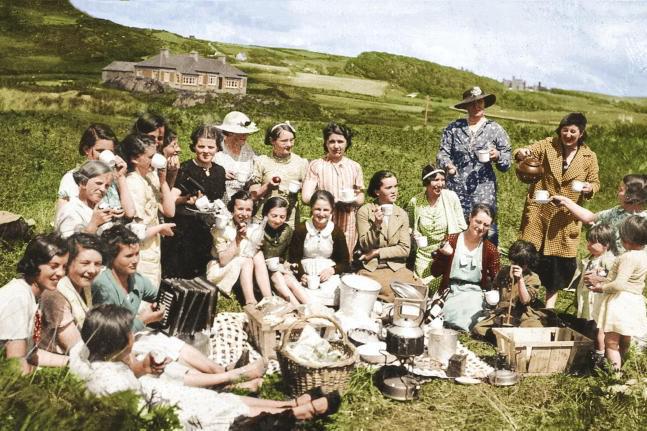
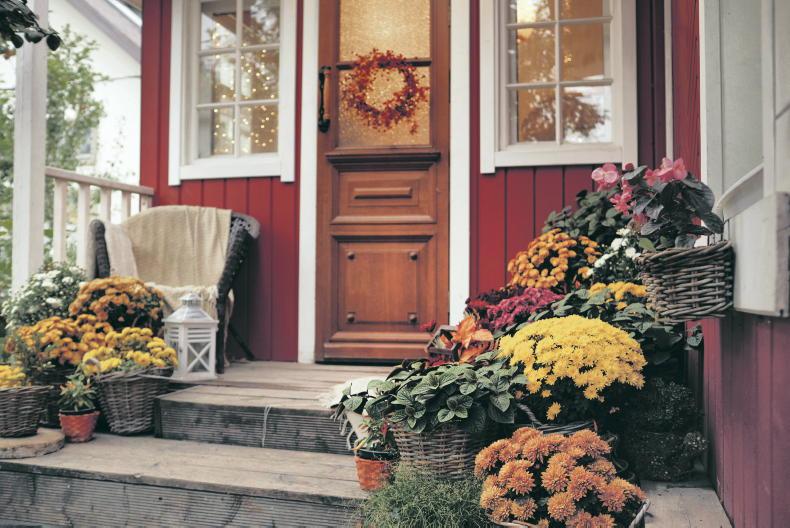
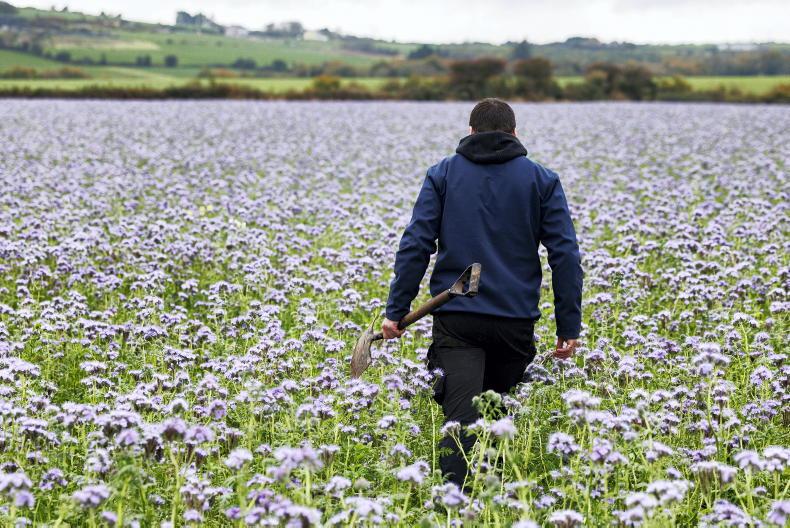
SHARING OPTIONS